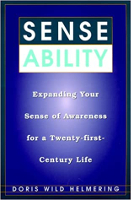
Image by Bessi
So habitual is the trance of ordinary life that one could say that human beings are a race that sleeps and awakens, but does not awaken fully. Because half-awake is sufficient for the task we customarily do, few of us are aware of the dysfunction of our condition. -- Arthur Deikman
Several of us were waiting in line for coffee when a man edged his way up to the counter and gave the young server his order. The server smiled and said she would be with him shortly. Only a few minutes had passed when suddenly the man slammed his fist on the counter and declared, "This is ridiculous!"
The man's wife moved closer and gently patted her husband's arm, inviting him to be patient. The man glared at her and announced loudly that he had more important things to do. With that, he turned abruptly and walked away.
The server, clearly upset, apologized to all of us who were waiting. When she gave me my coffee, she apologized again.
Anyone watching the scene might think that the man was not using the good sense God gave him. In essence, he was not using his sense of awareness.
What Is Sense Ability?
Sense ability is the skill to fully use your sense of awareness. It is the ability to observe your thoughts, your feelings, and your behavior. It lets you see how your thinking creates many of your feelings and how your thoughts and feelings influence your behavior. Sense ability also makes you aware of others and provides real-time feedback as to how your feelings and behavior affect others -- inhibiting or inviting closeness, empathy, tolerance, emotional intimacy, interconnectedness, and oneness.
If the impatient man at the coffee counter had used his sense of awareness, his sense ability, he would have noticed that the attendant was busy and that his fellow humans were also waiting. Observing that he was choosing to think negative thoughts such as, "This is taking too long" and "I have more important things to do," he would have understood that his own thoughts were creating his anger.
His sense ability might have alerted him that his automatic response pattern of anger was kicking in because things were not going his way. He would have realized that he could change his thoughts to more neutral or positive ones such as, "I'm running late so I'll get coffee later," "This is a busy place," or "That coffee does smell good." By changing his thoughts, he would have changed his feelings and behavior.
If the man had used his sense ability, he might have observed that his wife was trying to comfort him as well as save herself from embarrassment. He would have seen himself rejecting his wife's reaching out. He might have determined that he had ample time to wait. And he might have had the added bonus of enjoying coffee with his wife.
In this situation the server also failed to use her sense ability. If she had, she might have realized that she was doing the best she could serving people on a first-come basis. She would have been aware that this man was using anger to try to control the situation. And she would not have felt guilty and anxious and that it was her responsibility to make everything better.
What About You?
Your sense ability has been with you since birth. It is involved on some level in all thought processes. Although its potential is undeveloped in most people, you subconsciously make use of it many times each day. You use it to determine if you're getting your point across when talking to a mate or colleague. You use it when you listen to your child and judge what kind of a day he's having. You use it when you get up in the morning and check your mood. You use it to decide how much information to share with a new friend. You continually use the information provided by your sense of awareness to monitor, modify, and change your thoughts, feelings, and behavior.
All your senses provide your brain with hundreds of thousands of pieces of information per second. Your sense of smell allows you to identify ten thousand different odors. The human ear is capable of differentiating some three hundred thousand tones. One billion messages per second flash into your brain from the retina, allowing you to distinguish color, size, shape, texture, distance, and space. Your hand alone has seventeen thousand tactile receptors. Ten thousand taste buds inform you whether something is sweet, salty, sour, or bitter. And intuition allows you to "know" without benefit of rational thought, information, or data.
As your other senses feed your brain with hundreds of thousands of pieces of information, your sense of awareness takes in that information, as well as your own thoughts, feelings, and actions, and your observations of others, and provides even more data. The more information you have about yourself -- the thoughts you choose to think, the feelings you choose to feel, as well as the appropriateness and inappropriateness of your actions -- and the more perceptive you are of others, the more developed is your sense ability.
Reprinted with permission of the publisher, Quill,
an imprint of HarperCollins Publishers.
www.harpercollins.com. ©1999.
Article Source
Sense Ability: Expanding Your Sense of Awareness for a Twenty-First-Century Life
by Doris Wild Helmering.
 A psychotherapist shows readers how to deepen their awareness by asking important questions of themselves, using anecdotes from former patients to demonstrate the power of her techniques. Offers questions and exercises designed to promote self awareness and improve one's relationships, peace of mind, and satisfaction
A psychotherapist shows readers how to deepen their awareness by asking important questions of themselves, using anecdotes from former patients to demonstrate the power of her techniques. Offers questions and exercises designed to promote self awareness and improve one's relationships, peace of mind, and satisfaction
About The Author
 Doris Wild Helmering is the author of several books, including Being Ok Just Isn't Enough and Sense Ability. She is a marriage and family counselor in St. Louis, MO in private practice. She has written numerous self-help books, two children’s books, one middle grade book and numerous booklets, appeared on Oprah three times, had her own segment on television, her own radio show, consulted for a number of fortune five-hundred companies, and has logged over 51,000 hours doing individual, marital, group and family therapy.
Doris Wild Helmering is the author of several books, including Being Ok Just Isn't Enough and Sense Ability. She is a marriage and family counselor in St. Louis, MO in private practice. She has written numerous self-help books, two children’s books, one middle grade book and numerous booklets, appeared on Oprah three times, had her own segment on television, her own radio show, consulted for a number of fortune five-hundred companies, and has logged over 51,000 hours doing individual, marital, group and family therapy.
Visit her website at DorisWildHelmering.com























